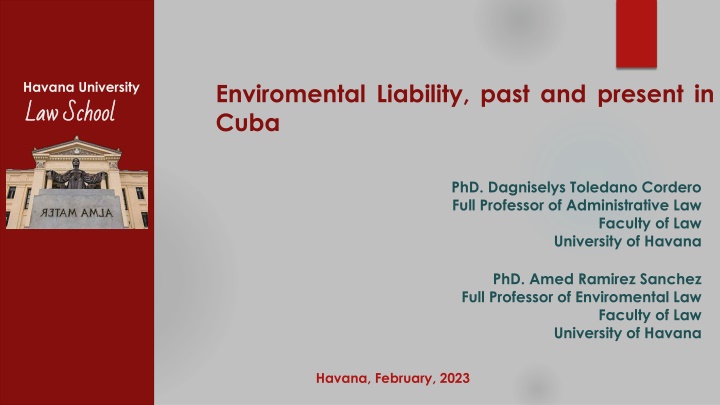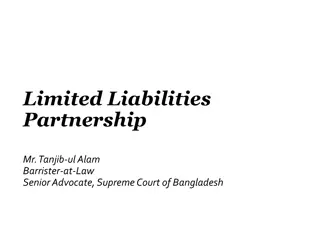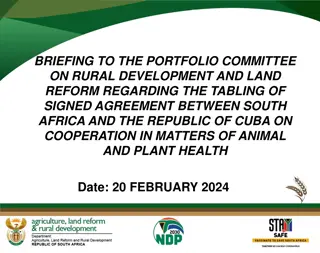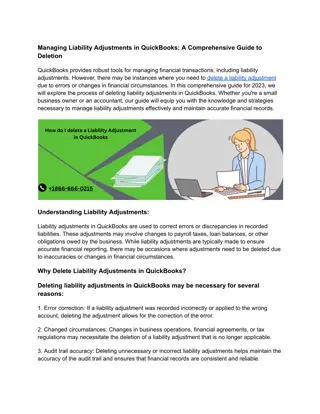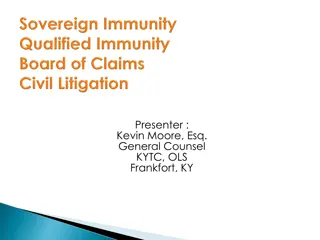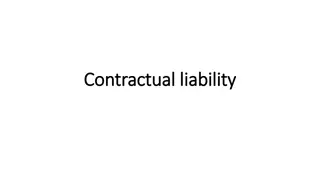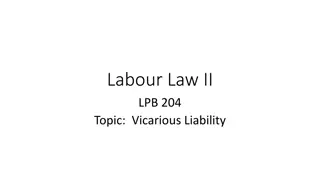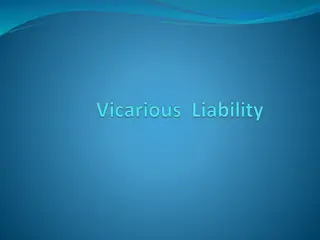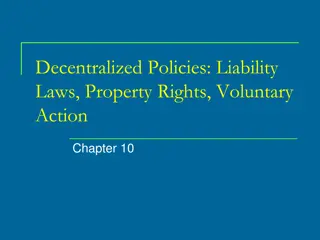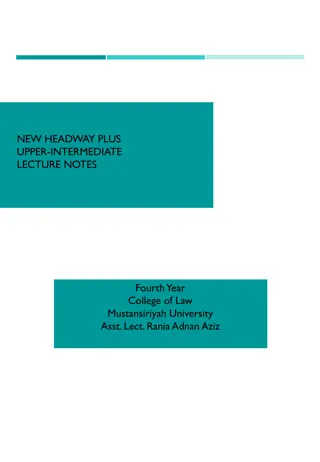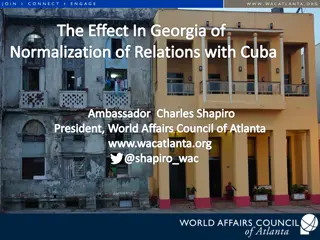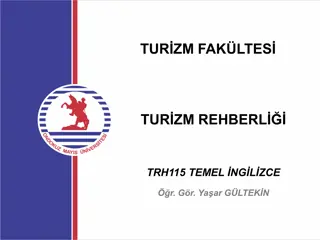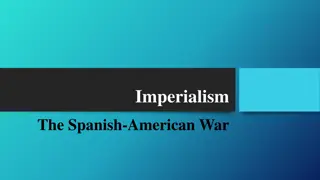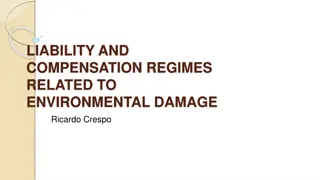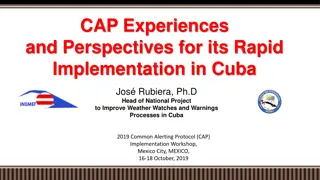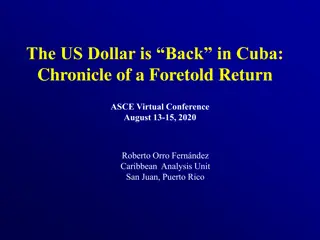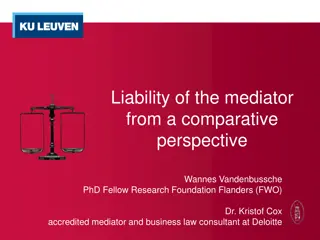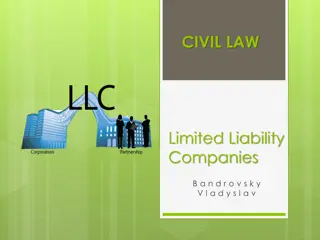Environmental Liability in Cuba: Past and Present Perspectives
Exploration of the evolution of environmental liability in Cuba, focusing on the legal framework, administrative processes, and jurisdiction. Discusses the value of the administrative process, constitutionalization of administrative law, and advancements in jurisdiction. Emphasis on the role of authorities and entities in addressing environmental issues.
Download Presentation

Please find below an Image/Link to download the presentation.
The content on the website is provided AS IS for your information and personal use only. It may not be sold, licensed, or shared on other websites without obtaining consent from the author.If you encounter any issues during the download, it is possible that the publisher has removed the file from their server.
You are allowed to download the files provided on this website for personal or commercial use, subject to the condition that they are used lawfully. All files are the property of their respective owners.
The content on the website is provided AS IS for your information and personal use only. It may not be sold, licensed, or shared on other websites without obtaining consent from the author.
E N D
Presentation Transcript
Enviromental Liability, past and present in Cuba Havana University Law Law School School PhD. Dagniselys Toledano Cordero Full Professor of Administrative Law Faculty of Law University of Havana PhD. Amed Ramirez Sanchez Full Professor of Enviromental Law Faculty of Law University of Havana Havana, February, 2023
Value of the administrative process in the rule of law Administrative juridical relationship Adequacy of the administrative jurisdiction as a solution to social conflicts. Its application to Environmental Law Administrative Private law Ordinary judicial protection of rights Commercial law Labor law Criminal Judicial protection in concentrated mechanisms Constitutional jurisdiction
Value of the constitutionalization of the process and substantive bases of administrative law and its application to environmental law. Direct application Principles of due process Law Supremacy Access justice to Public Liability o Right to a healthy and balanced environment. (art.75) right to consume quality goods and services that do not harm their health (art 78) right accurate information about these (art 78) of access and to truthful
Advances Jurisdiction Construction of an objective model (article 5 and subsequent articles of Law 142 of 2021). Collapse of the old subjective model LPCALE 655 et seq. Article 6. Correspond to the jurisdiction in administrative matters the claims that are established in relation to administrative acts, regulatory provisions, material actions and omissions of: a) The Council of Ministers, within the scope of its executive-administrative powers, its Executive Committee and its dependencies or subordinate or attached entities; b) the agencies of the Central State Administration, their subordinate or attached entities and, as the case may be, their delegations or territorial directorates; Ministry of Science, Technology and Environment
Advances Construction of an objective model (article 5 and subsequent articles of Law 142 of 2021). Jurisdiction Article 6. Correspond to the jurisdiction in administrative matters the claims that are established in relation to administrative acts, regulatory provisions, material actions and omissions of: Transformation Transformation News c) municipal companies that provide public services, perform any public function or exercise public powers; national, provincial entities or d) the governors, within the scope of their executive-administrative competences, and the structures of the provincial administration, as well as their dependencies subordinate entities e) municipal and other structures of the municipal administration, its subordinate agencies and entities; The councils administration of the and and or attached
Advances Construction of an objective model (article 5 and subsequent articles of Law 142 of 2021). Jurisdiction Article 6. Correspond to the jurisdiction in administrative matters the claims that are established in relation to administrative acts, regulatory provisions, material actions and omissions of: Novedad Novedad Novedad f) The General Comptroller of the Republic g) the Attorney General's Office of the Republic h) organizations and entities of associative basis of a professional nature and with public purposes
Competence Article 13.1. The Provincial People's Court shall be responsible for hearing, in the first instance, the claims of g) those arising from non-compliance with regulations on environmental and natural resources protection, or related to environmental damage in the national territory, including internal waters, the territorial sea, the exclusive economic zone and the continental shelf; h) claims for compensation or compliance for the preservation of the environment and the protection of natural resources;
Diversificacin Advances subjects Redacci n m s coherente Whoever alleges ownership of an individual right or legitimate interest. The public prosecutor, in the proceedings determined by law The competent administrative authority elimination of the limit of non- compensation of legitimate interests as rights in the making Any collective or diffuse interest, in matters related to the defense of the environment, cultural heritage, and territorial and urban planning. person alleging a
Extensin del objeto Avances Objeto del proceso NEWS Claims for administrative omissions Claims protection and environmental damage in relation to environmental Claims in connection with material administrative proceedings Claims in connection with compulsory expropriation.
Claims relating to environmental protection and environmental damage Article 54. Claims may be filed in order to: (a) obtaining compliance with regulations on the protection of the environment and natural resources; b) the preservation of the environment and the protection of natural resources; c) compensation for environmental damages.
La responsabilidad ambiental, el Derecho a la proteccin del medio ambiente y el Proceso de Amparo Constitucional This law regulates the process for the courts to hear claims in relation to the violation of the rights enshrined in the Constitution of the Republic, in the event of damages suffered by individuals, caused by the organs of the State, its directors, officers or employees, due to the improper action or omission of their functions, and by individuals or non-State entities, in accordance with the provisions of Article 99 of the Magna Carta. Article 22.1. The claim is formulated in writing, in which the following are expressed: (e) the specific claim to be deduced aimed at achieving the restitution of the violated constitutional right and obtaining reparation for damages or compensation for the harm resulting from the violation; 2. Claims for constitutional protection cannot be accumulated with other claims of an ordinary nature.
Transcendence criteria What does this concept imply? Singular violation of positive legal situation (subjective rights and legitimate interests). Effect on the essential content of constitutionally recognized rights. Establishment of limits to the essential content of the rights due to the act or action being challenged. Differentiation of the situation of ordinary breach of legality Argue how a particular situation transcends the configuration of the right.
